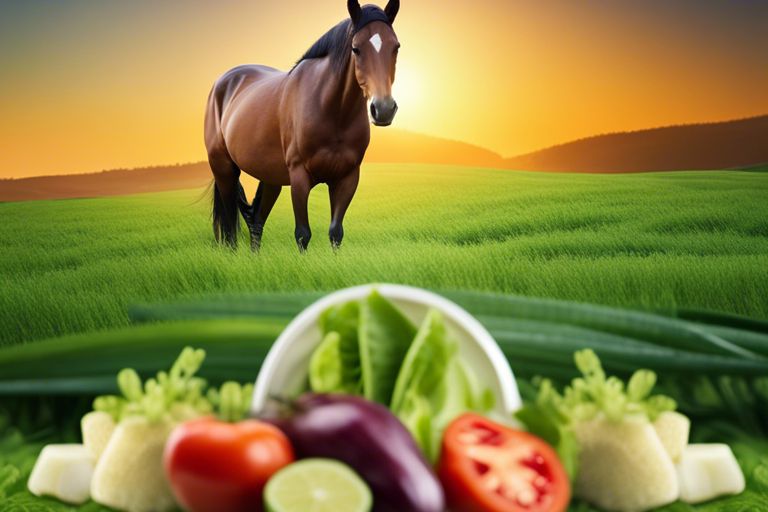This guide will help you ensure your horse maintains optimal health through a well-balanced diet. Your horse’s diet is crucial for its overall well-being and performance. Proper nutrition plays a key role in maintaining your horse’s weight, energy levels, and immune system. With expert advice, you can create a balanced diet that meets all your horse’s nutritional needs. Let’s explore the importants of equine nutrition to keep your horse happy and healthy!
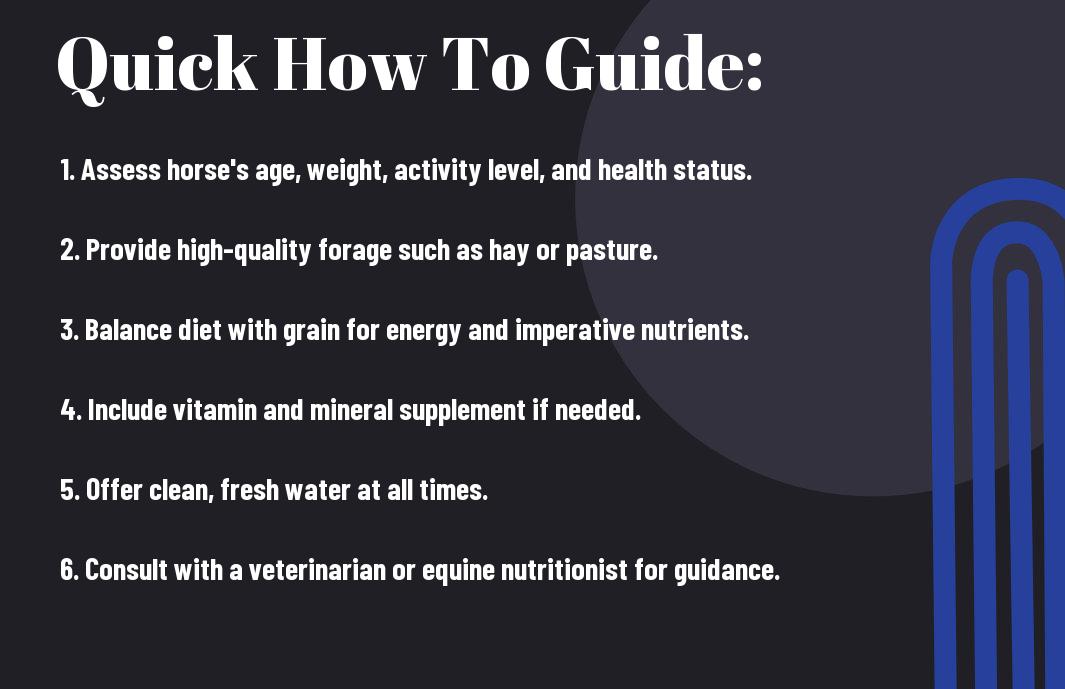
Understanding Your Horse’s Nutritional Needs
To ensure your horse stays healthy and performs at its best, it’s crucial to understand its nutritional needs. By evaluating its diet and energy requirements, you can tailor a feeding plan that provides the necessary nutrients for optimal health and performance.
Factors to Consider When Evaluating Your Horse’s Diet
One of the key factors to consider when evaluating your horse’s diet is its daily activity level. Your horse’s energy requirements will vary depending on whether it is a performance horse in heavy work or a pasture pet. Additionally, age, breed, and overall health condition play a role in determining the appropriate dietary needs for your horse.
- Activity level
- Age, breed, and health condition
Assume that your horse is a senior horse, it will likely require a different dietary plan than a young, growing horse. Adjust your horse’s diet accordingly to meet its specific needs.
Determining Your Horse’s Energy Requirements
An important aspect of your horse’s nutritional needs is understanding its energy requirements. The amount of energy your horse needs is influenced by factors such as age, level of work, and health condition. By calculating your horse’s energy requirements, you can ensure it receives the appropriate amount of nutrition to support its daily activities and overall well-being.
One of the key components of your horse’s diet is providing the right balance of energy sources, including protein, carbohydrates, and fat. Each nutrient plays a crucial role in your horse’s diet, supporting various functions such as muscle development, energy production, and overall health. Ensure your horse’s diet is tailored to provide the necessary nutrients in the right amounts for optimal health.
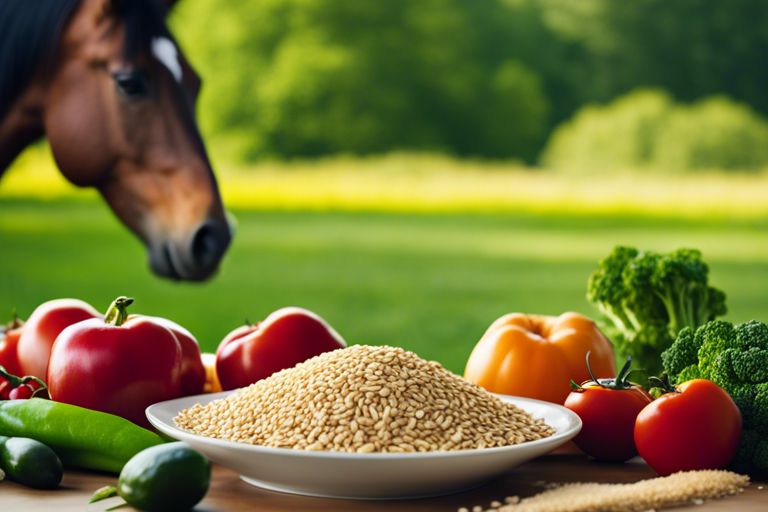
Choosing the Right Hay for Your Horse
If you want to ensure your horse’s diet is balanced and nutritious, selecting the right hay is crucial. Hay is a primary source of forage for horses and provides necessary nutrients to support their health and well-being.
Tips for Selecting High-Quality Hay
- When choosing hay for your horse, look for fresh, leafy, and soft-textured varieties.
- Ensure the hay is clean, free of mold, dust, and weeds that could harm your horse.
- Smell the hay to make sure it has a sweet, fresh aroma, indicating good quality.
Knowing the nutritional value of the hay you feed your horse is necessary for maintaining their health and performance.
How to Analyze Hay Quality and Nutritional Content
With a better understanding of hay quality and nutritional content, you can make informed decisions about your horse’s diet. Your horse’s nutritional needs vary depending on factors such as age, activity level, and health condition. By analyzing the protein, fiber, and mineral content of hay, you can adjust their diet accordingly to meet their specific requirements.
Your horse’s well-being depends on the quality of the hay you provide. By carefully selecting and analyzing hay for its nutritional value, you can ensure your horse receives the necessary nutrients for optimal health and performance.
Grains and Concentrates: How to Make the Right Choice
Understanding the Role of Grains and Concentrates in Your Horse’s Diet
For your horse to maintain a balanced diet, it’s crucial to understand the role that grains and concentrates play. Grains and concentrates are rich sources of energy, protein, vitamins, and minerals that can supplement your horse’s forage intake. They are especially beneficial for performance horses or those with higher energy requirements.
How to Select the Best Grain and Concentrate Options for Your Horse
Horse owners must carefully choose the right grains and concentrates to meet their horse’s unique nutritional needs. Consider factors such as your horse’s age, activity level, weight, and overall health when selecting a feed. Consult with your veterinarian or an equine nutritionist to determine the best options for your horse’s specific requirements.
Understanding the nutritional content of different grains and concentrates is crucial in making the right choice for your horse. Be aware of any allergies or sensitivities your horse may have to certain ingredients and opt for high-quality feeds from reputable brands to ensure your horse receives the necessary nutrients without any harmful additives.
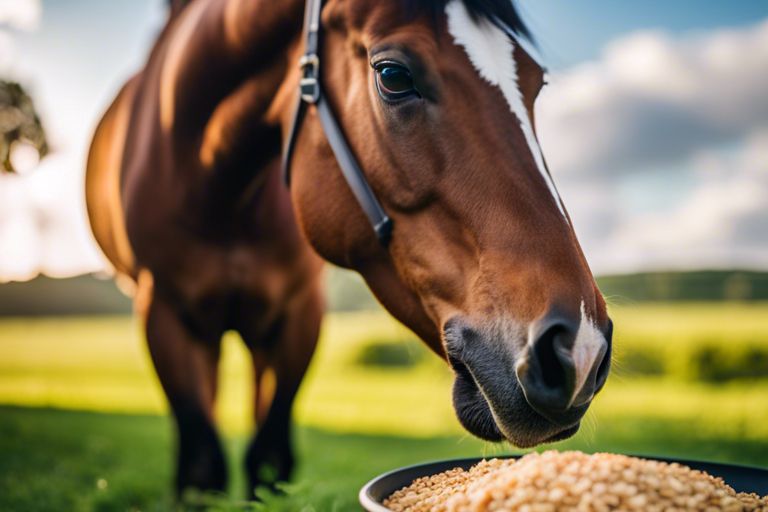
Vitamins and Minerals: The Essential Supplements
Unlike protein and carbohydrates, vitamins and minerals are required by your horse in much smaller amounts but are still vital for overall health and well-being. Minerals such as calcium, phosphorus, magnesium, and potassium, as well as vitamins like A, D, E, and K, play crucial roles in various bodily functions including bone health, muscle function, immune support, and overall metabolism.
How to Identify Vitamin and Mineral Deficiencies in Your Horse
Some common signs of vitamin and mineral deficiencies in horses include poor coat quality, lethargy, weight loss, reduced performance, and susceptibility to infections. If you notice any of these symptoms, it’s vital to consult with your veterinarian to determine the specific deficiencies and the appropriate course of action to address them.
Tips for Choosing the Right Vitamin and Mineral Supplements
Mineral deficiencies can vary depending on factors such as age, activity level, and the quality of your horse’s diet. When identifying supplements for your horse, pay attention to the specific minerals that are lacking in their diet. Consider factors such as the form of the supplement (pellets, powders, liquids), bioavailability, and any additional ingredients that may benefit your horse’s health.
- Ensure the supplement is suitable for your horse’s age and activity level
- Look for supplements that provide a balance of vital vitamins and minerals
- Check for third-party certifications or approvals to guarantee the quality and purity of the supplement
- Assume that natural sources of vitamins and minerals are generally more bioavailable than synthetic forms
Hydration: The Often-Overlooked Aspect of Horse Nutrition
After ensuring your horse’s diet is well-balanced and meets all their nutritional needs, it’s crucial not to overlook the aspect of hydration. Just like humans, horses require a consistent and adequate intake of water to maintain their health and well-being.
How to Ensure Your Horse is Getting Enough Water
Any responsible horse owner knows that access to fresh, clean water is vital for their horse’s health. Make sure your horse has constant access to clean water, checking and refilling their water source regularly to ensure it’s always fresh. Pay attention to your horse’s water intake, especially during hot weather or after intense exercise, and encourage them to drink more if necessary.
Factors Affecting Your Horse’s Water Intake
To make sure your horse stays properly hydrated, you need to consider various factors that can affect their water intake. Keep in mind that the size, age, weight, and activity level of your horse can all impact how much water they need to drink. The climate and weather conditions also play a role in determining your horse’s hydration needs. Additionally, some medical conditions or medications may increase your horse’s need for water, so it’s important to consult with your veterinarian if you have any concerns about your horse’s hydration levels.
- Size, age, weight, and activity level
- Climate and weather conditions
- Medical conditions or medications
The importance of monitoring your horse’s water intake cannot be overstated, as dehydration can lead to serious health issues and even be life-threatening. Ensuring your horse has constant access to fresh water and adjusting their intake based on their individual needs is key to maintaining their well-being.
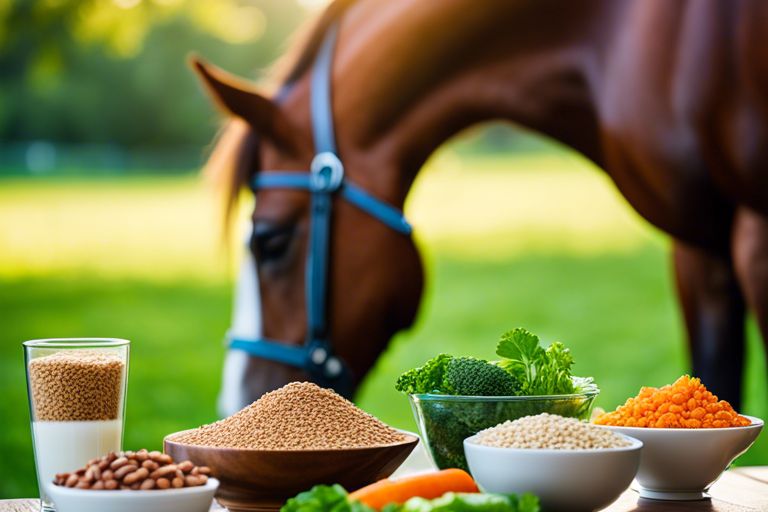
Avoiding Common Diet Mistakes
All horse owners want to provide the best nutrition for their equine companions, but it’s easy to make mistakes when it comes to balancing your horse’s diet. Here are some common pitfalls to avoid to ensure your horse stays healthy and happy.
How to Identify and Correct Imbalances in Your Horse’s Diet
To ensure your horse’s diet is balanced, you need to carefully monitor what you are feeding them. Look for signs of nutritional deficiencies or excess, such as poor coat condition, weight loss or gain, lethargy, or behavioral changes. If you suspect an imbalance, consult with a veterinarian or equine nutritionist to develop a plan to correct it. This may involve adjusting the types or amounts of feed, supplements, or forage your horse receives.
Tips for Preventing Over-Supplementation and Under-Supplementation
One of the biggest mistakes horse owners make is over-supplementing or under-supplementing their horses. To prevent over-supplementation, carefully read labels and only provide supplements that are necessary for your horse’s specific needs. Avoid doubling up on similar supplements or providing unnecessary additives. On the other hand, to prevent under-supplementation, make sure your horse is getting all the necessary nutrients they need for their age, workload, and health status. Consult with a professional to create a balanced supplement plan tailored to your horse.
- Do not exceed recommended dosages for supplements.
- Consult with a veterinarian or nutritionist before adding new supplements to your horse’s diet.
After implementing these tips, you can ensure that your horse’s diet is well-balanced and meets all their nutritional requirements. Bear in mind, moderation and balance are key to keeping your horse healthy and thriving.
To wrap up
Following this expert advice on achieving a balanced horse diet can help you ensure that your horse receives all the nutrients it needs to stay healthy and perform at its best. By focusing on providing a good-quality forage, supplementing with the right amount of concentrates, and keeping an eye on your horse’s weight and condition, you can create a well-rounded diet that meets all of its nutritional requirements.
Remember that every horse is unique, so it’s vital to work closely with your veterinarian or an equine nutritionist to tailor a diet specifically for your horse’s individual needs. With proper planning and attention to detail, you can help your horse thrive and enjoy a long, healthy life.
Q: Why is a balanced diet important for horses?
A: A balanced diet is vital for maintaining a horse’s overall health, supporting proper growth and development, and ensuring optimal performance. It provides the necessary nutrients, vitamins, and minerals that horses need to function at their best.
Q: What are the key components of a balanced horse diet?
A: A balanced horse diet should consist of high-quality forage such as grass or hay, supplemented with grains or concentrates as needed. It should also include adequate amounts of protein, carbohydrates, fats, vitamins, and minerals.
Q: How can I determine if my horse’s diet is balanced?
A: To ensure your horse’s diet is balanced, consult with a veterinarian or equine nutritionist. They can evaluate your horse’s body condition, activity level, and overall health to recommend the appropriate feed and supplements to meet their specific needs.
Q: What are the signs of an imbalanced horse diet?
A: Signs of an imbalanced horse diet may include weight loss or gain, poor coat quality, lethargy, digestive issues, and overall unthriftiness. It’s important to address any concerns promptly to prevent nutritional deficiencies or excesses.
Q: How can I make dietary adjustments to achieve a balanced horse diet?
A: Work with a professional to create a customized feeding plan based on your horse’s individual requirements. Monitor your horse’s body condition regularly and make adjustments as needed to ensure they are receiving the proper nutrition for optimal health and performance.
